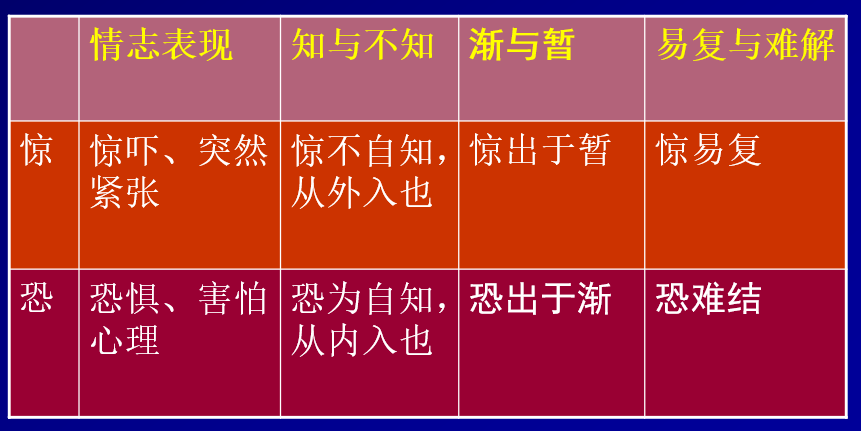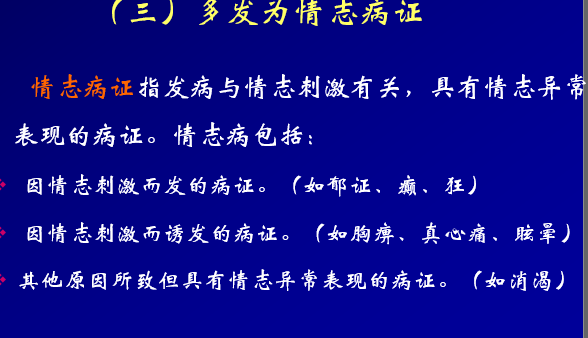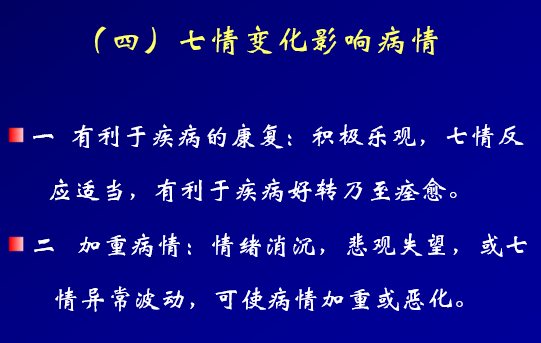The Seven Emotions as Causes of Internal Injury
The seven emotions refer to joy, anger, worry, contemplation, sadness, fear, and shock, which are normal emotional activities and represent the human mind’s response to external stimuli. The seven emotions are closely related to the functional activities of the body’s organs. They are categorized under the five organs, with joy, anger, worry, sadness, and fear representing the five emotions.
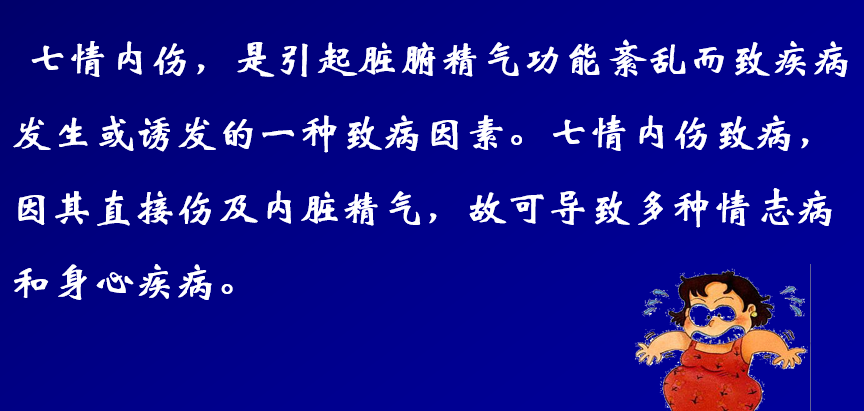
As a cause of disease, the seven emotions refer to excessively strong, prolonged, or sudden emotional changes that lead to imbalances in the organs’ qi, blood, yin, and yang, resulting in illness. Diseases caused by the seven emotions are termed “diseases caused by stagnation”. Additionally, certain chronic diseases can lead to long-term dysfunction of the organs, resulting in abnormal emotional states, referred to as “diseases caused by illness leading to stagnation”. The seven emotions are also related to the body’s inherent tolerance and regulatory capacity. Unlike the six excesses, which primarily invade the body through the mouth, nose, or skin, the seven emotions directly affect the relevant organs and cause disease. The seven emotions can not only trigger various diseases but also significantly influence the progression of diseases, promoting either improvement or deterioration. Since the seven emotions are one of the main pathogenic factors causing internal injury, they are also referred to as “internal injury from the seven emotions”.

The relationship between the seven emotions and the organs’ qi and blood: The emotional activities of the human body are closely related to the organs. The basic principle is: the heart governs joy; excessive joy harms the heart; the liver governs anger; excessive anger harms the liver; the spleen governs contemplation; excessive contemplation harms the spleen; the lungs govern sadness and worry; excessive sadness and worry harm the lungs; the kidneys govern shock and fear; excessive shock and fear harm the kidneys. This indicates that organ dysfunction can lead to corresponding emotional responses, and excessive emotional responses can further damage the related organs. The theory that the seven emotions arise from and harm the five organs has significant guiding implications in diagnosis and treatment. Emotional activities are closely related to qi and blood. Changes in the organs’ qi and blood can also affect emotional changes. Hence, it is said: “When blood is abundant, there is anger; when it is insufficient, there is fear”. The physiological activities of the organs must be based on qi and blood, while emotional activities are manifestations of the physiological functions of the organs, thus the emotional activities of the human body are closely related to the organs’ qi and blood.
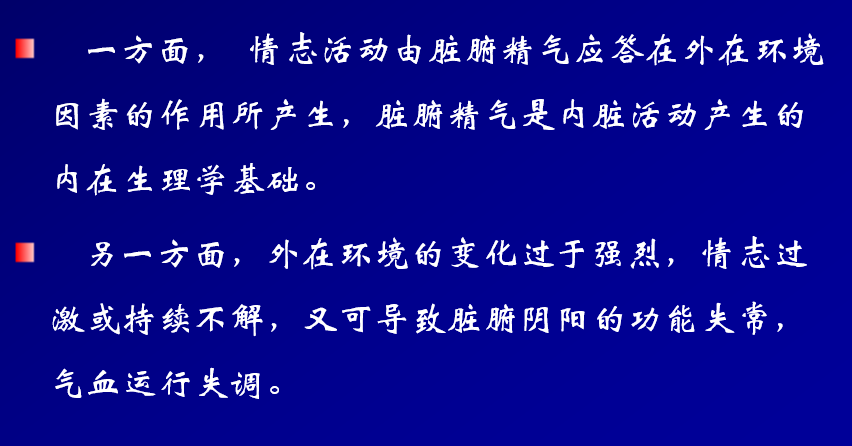
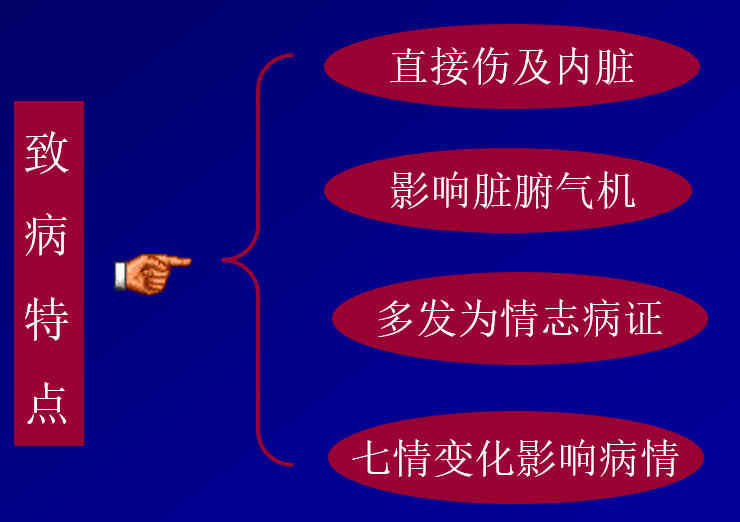
Characteristics of diseases caused by the seven emotions: The seven emotions belong to psychological pathogenic factors, and their onset is always related to significant psychological stimuli. Throughout the course of the disease, changes in emotions can lead to significant changes in the condition. For example, epilepsy is often caused by emotional injury; depression harms the liver, leading to liver qi stagnation, which damages the spleen, resulting in phlegm accumulation, which can confuse the mind and lead to loss of control. Mania is often caused by anger and frustration, which injure the liver and gallbladder, leading to unexpressed emotions, stagnation, and transformation into fire, which consumes body fluids, resulting in phlegm-fire that disturbs the mind, causing confusion and chaos. It is evident that psychological factors play a crucial role in the onset and progression of diseases. Although excessive emotions can harm the five organs, the relationship with the heart and liver is particularly close. The heart is the master of the five organs and six bowels; all life activities are manifestations of the functions of the five organs, which must be governed by the heart. Damage to the heart spirit inevitably involves other organs. Liver dysfunction and qi stagnation are also key mechanisms in the onset of emotional diseases. The heart governs blood and houses the spirit; the liver stores blood and governs the smooth flow of qi; the spleen governs transformation and transportation and is the pivot for the rise and fall of qi, as well as the source of qi and blood generation. Therefore, emotional injuries primarily affect the heart, liver, and spleen, leading to qi and blood imbalances. Damage from the seven emotions can lead to dysfunction of the heart, liver, and spleen, which can occur independently or often interact and compound harm, such as excessive worry, overworking the heart and spleen, unresolved anger, and disharmony between the liver and spleen, etc. Furthermore, disturbances in emotional activities such as joy, anger, worry, contemplation, and fear can lead to disordered qi flow in the organs, stagnation, and transformation into fire, resulting in symptoms such as irritability, anger, insomnia, flushed face, bitter mouth, and even symptoms of bleeding such as hemoptysis and epistaxis, referred to as “transformation of the five emotions into fire”. Emotional disturbances can also lead to “six stagnations” as a disease, meaning qi stagnation leads to dampness, dampness leads to heat, heat leads to phlegm, phlegm leads to blood stasis, and blood stasis leads to food stagnation. In other words, qi stagnation can lead to blood stasis, phlegm stagnation, dampness stagnation, and food stagnation as diseases. Joy, anger, worry, contemplation, sadness, fear, and shock are referred to as the seven emotions, while the addition of cold and heat is termed the nine emotions. If the seven emotions change excessively, the five emotions become extreme, leading to qi disharmony, either qi stagnation or abnormal rise and fall. Damage from the seven emotions causes disordered qi flow in the organs, abnormal blood circulation, and imbalances in yin and yang. Different emotional changes manifest differently in terms of qi disharmony. Anger causes qi to rise; joy causes qi to relax; sadness causes qi to dissipate; contemplation causes qi to stagnate; fear causes qi to descend; shock causes qi to become chaotic.
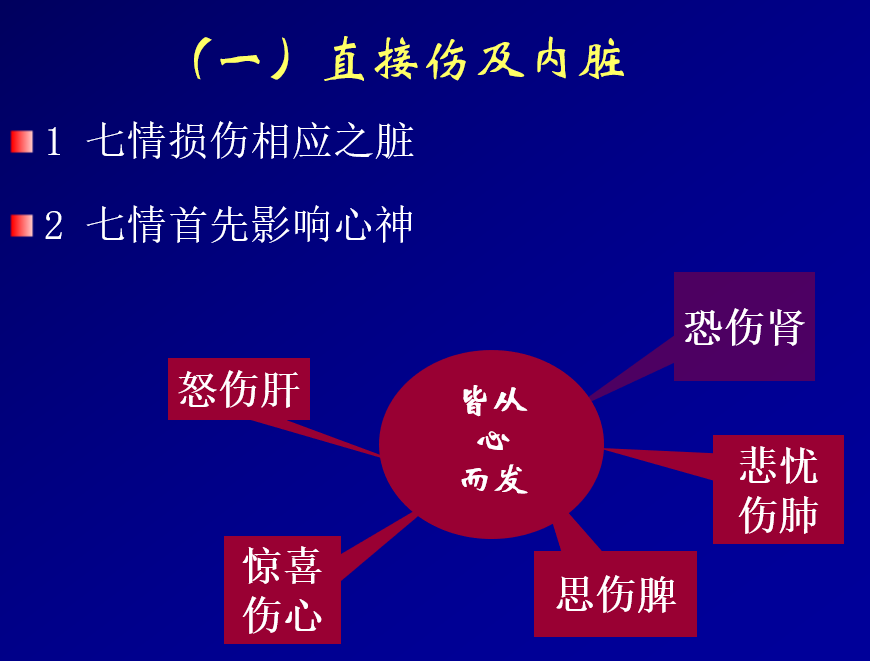
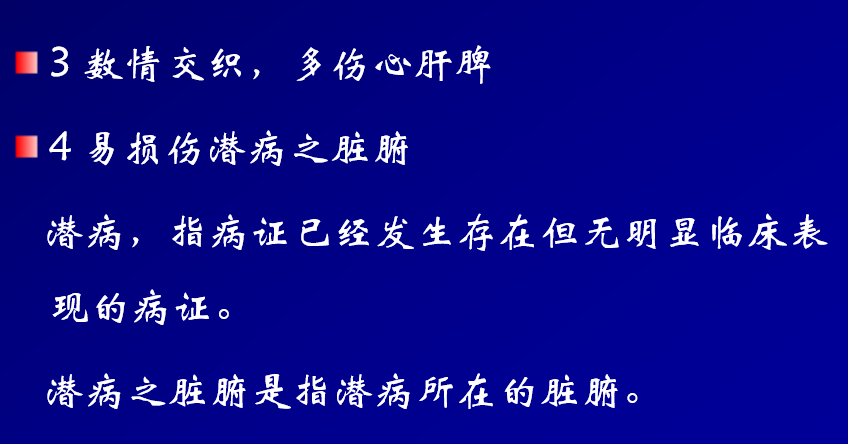
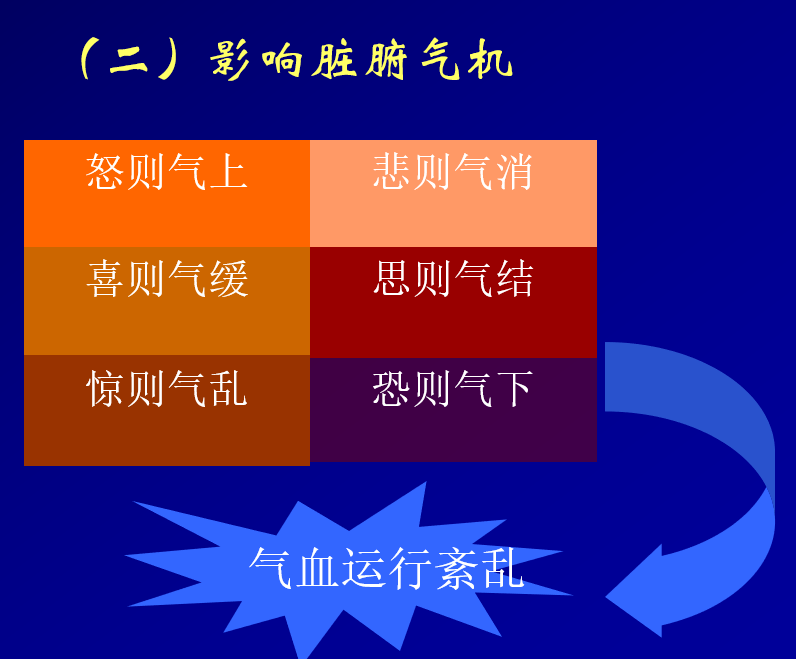
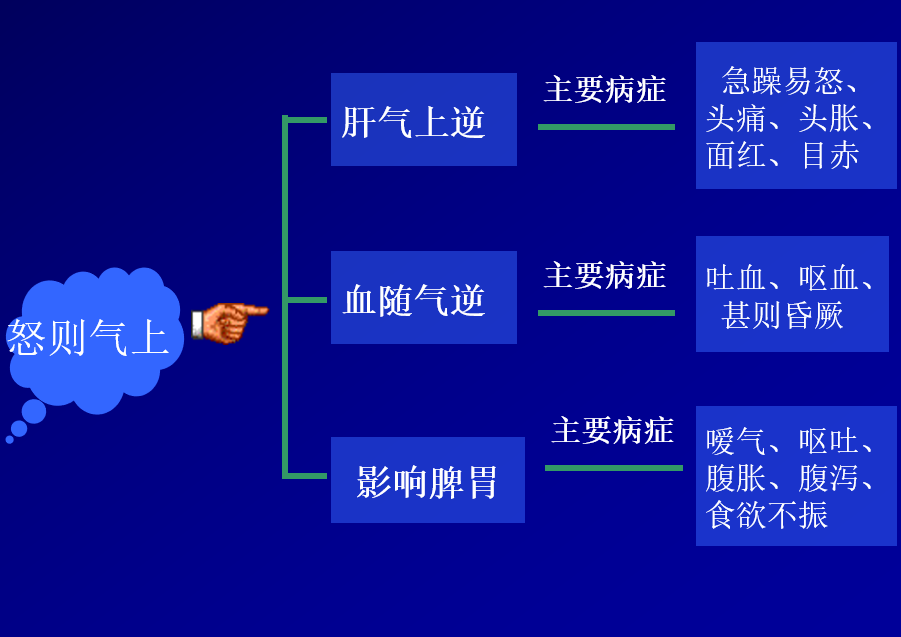
Anger causes qi to rise: Qi rising refers to the upward reversal of qi flow. Anger is associated with the liver. Generally, temporary anger due to frustration or unmet desires does not cause illness. However, violent anger can harm the liver, causing liver qi to excessively rise and lead to illness. When liver qi rises, blood follows the qi upward, which can manifest as dizziness, headaches, flushed face, tinnitus, and in severe cases, vomiting blood or fainting. Liver qi rising can also affect the spleen, leading to abdominal distension and diarrhea. Diarrhea, also known as water and grain diarrhea, presents as undigested stools. If it affects the stomach, symptoms such as belching and vomiting may occur. Since the liver and kidneys share a common source, anger not only harms the liver but can also harm the kidneys. Kidney damage leads to symptoms such as fear, forgetfulness, and weakness in the lower back. The liver is considered a thief of the five organs; thus, abnormal liver qi flow can affect the physiological functions of various organs, leading to multiple pathological changes.
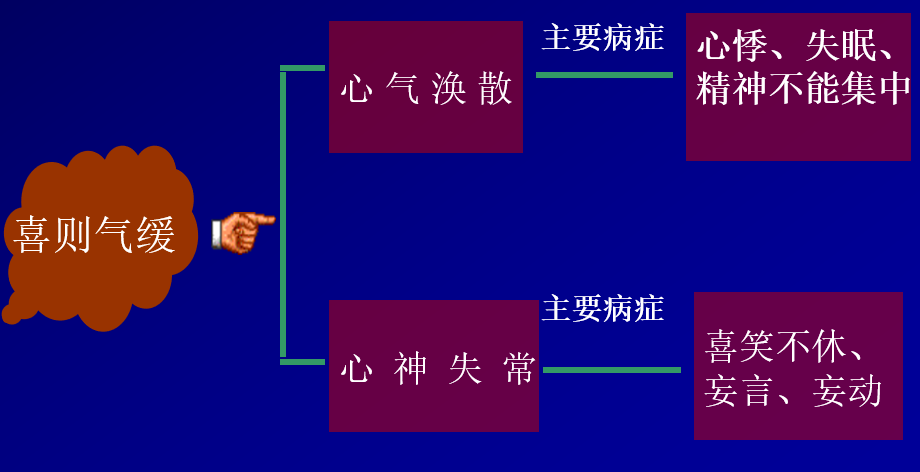
Joy causes qi to relax: Qi relaxation refers to the relaxation of the heart’s qi. Joy is associated with the heart. It includes both the calming of tense emotions and the dispersal of heart qi. Under normal circumstances, joy can alleviate tension, leading to a pleasant mood, harmonious qi and blood, and a state of health. However, excessive joy can lead to heart disease. Excessive joy harms the heart, causing heart qi to disperse, leading to symptoms such as fatigue, lethargy, lack of concentration, and even palpitations, confusion, or mania.
Sadness causes qi to dissipate: Qi dissipation refers to the consumption of lung qi. Sadness and worry are associated with the lungs. Sadness is an emotional expression of grief and sorrow. Excessive sadness often consumes lung qi, which can involve multiple organ dysfunctions such as the heart, liver, and spleen. For example, it can weaken lung qi, leading to symptoms such as shortness of breath, chest tightness, and mental fatigue. Sadness can also harm the liver, leading to mental confusion, and in severe cases, muscle spasms and discomfort in the ribs. Excessive sadness can also injure the heart qi, leading to palpitations and mental disorientation. Sadness can harm the spleen, leading to stagnation in the three burners, resulting in abdominal distension and weakness in the limbs.
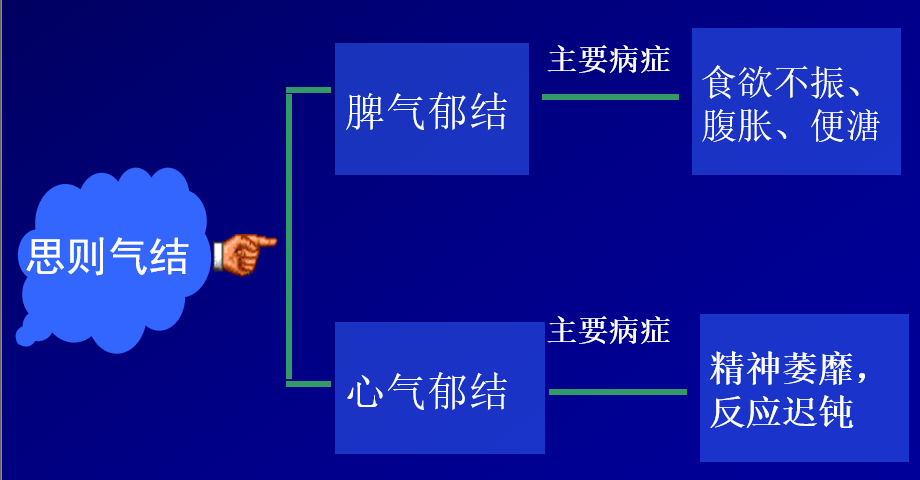
Contemplation causes qi stagnation: Qi stagnation refers to the stagnation of spleen qi. Contemplation is associated with the spleen. While contemplation is a normal physiological activity, excessive contemplation can lead to qi stagnation in the middle burner, causing spleen qi stagnation, resulting in symptoms such as poor appetite, abdominal distension, and diarrhea, and even muscle wasting. Contemplation arises from the spleen and manifests in the heart; excessive contemplation can harm the spleen and also harm heart blood, leading to symptoms such as palpitations, anxiety, insomnia, forgetfulness, and vivid dreams.
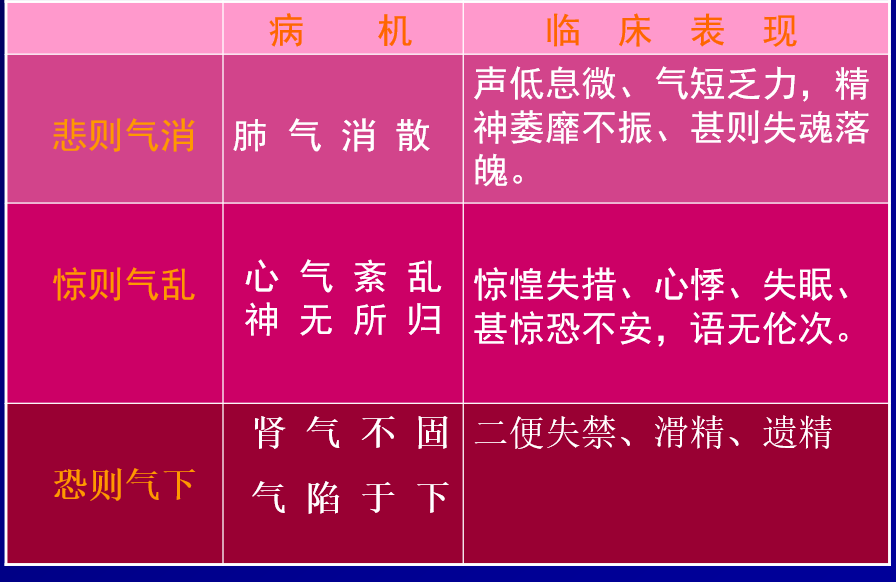
Fear causes qi to descend: Qi descent refers to the sinking of vital energy. Fear is associated with the kidneys. Fear is a psychological response of cowardice and dread. Prolonged fear or sudden shock can damage kidney qi, leading to what is termed “fear injures the kidneys”. Excessive fear can lead to kidney qi instability, causing symptoms such as incontinence, seminal emission, and weakness in the bones. Fear injures the kidneys, preventing the heart and lungs from receiving nourishment, leading to symptoms such as chest fullness, abdominal distension, anxiety, and insomnia. Shock causes qi disorder: Qi disorder refers to the disarray of heart qi. The heart governs blood and houses the spirit; excessive shock can disrupt heart qi, leading to imbalances in qi and blood, resulting in symptoms such as palpitations, insomnia, irritability, and even mental confusion. Shock differs from fear; fear is self-aware, while shock is not. Shock can disturb the heart and also harm the liver and gallbladder, leading to confusion and affecting the fetus, potentially causing congenital epilepsy. Abnormal fluctuations in emotions can exacerbate or rapidly worsen the condition, such as in patients with dizziness due to yin deficiency and yang excess; if they encounter anger, it can cause liver yang to surge, leading to dizziness, fainting, or even sudden loss of speech, hemiplegia, or facial droop, resulting in a stroke.
